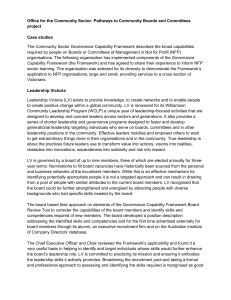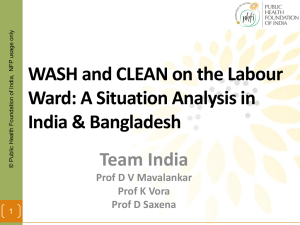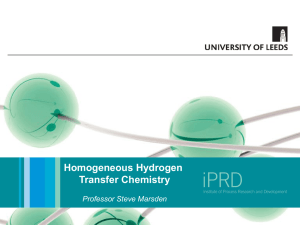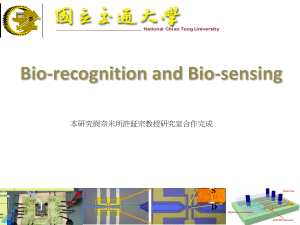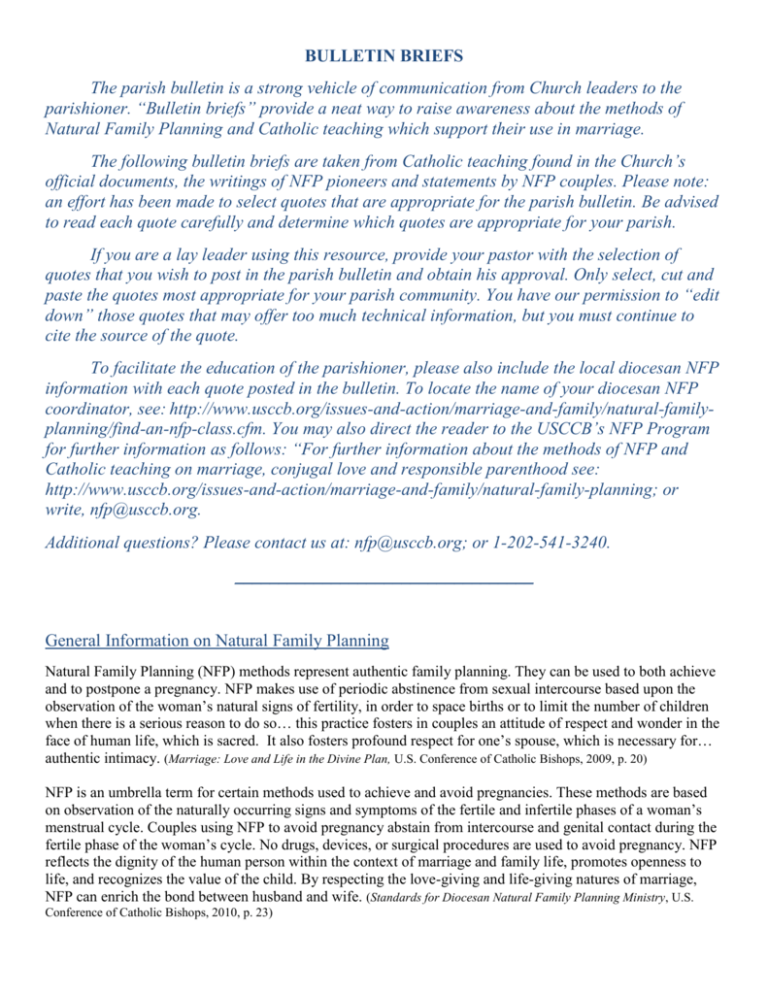
BULLETIN BRIEFS
The parish bulletin is a strong vehicle of communication from Church leaders to the
parishioner. “Bulletin briefs” provide a neat way to raise awareness about the methods of
Natural Family Planning and Catholic teaching which support their use in marriage.
The following bulletin briefs are taken from Catholic teaching found in the Church’s
official documents, the writings of NFP pioneers and statements by NFP couples. Please note:
an effort has been made to select quotes that are appropriate for the parish bulletin. Be advised
to read each quote carefully and determine which quotes are appropriate for your parish.
If you are a lay leader using this resource, provide your pastor with the selection of
quotes that you wish to post in the parish bulletin and obtain his approval. Only select, cut and
paste the quotes most appropriate for your parish community. You have our permission to “edit
down” those quotes that may offer too much technical information, but you must continue to
cite the source of the quote.
To facilitate the education of the parishioner, please also include the local diocesan NFP
information with each quote posted in the bulletin. To locate the name of your diocesan NFP
coordinator, see: http://www.usccb.org/issues-and-action/marriage-and-family/natural-familyplanning/find-an-nfp-class.cfm. You may also direct the reader to the USCCB’s NFP Program
for further information as follows: “For further information about the methods of NFP and
Catholic teaching on marriage, conjugal love and responsible parenthood see:
http://www.usccb.org/issues-and-action/marriage-and-family/natural-family-planning; or
write, nfp@usccb.org.
Additional questions? Please contact us at: nfp@usccb.org; or 1-202-541-3240.
__________________________________
General Information on Natural Family Planning
Natural Family Planning (NFP) methods represent authentic family planning. They can be used to both achieve
and to postpone a pregnancy. NFP makes use of periodic abstinence from sexual intercourse based upon the
observation of the woman’s natural signs of fertility, in order to space births or to limit the number of children
when there is a serious reason to do so… this practice fosters in couples an attitude of respect and wonder in the
face of human life, which is sacred. It also fosters profound respect for one’s spouse, which is necessary for…
authentic intimacy. (Marriage: Love and Life in the Divine Plan, U.S. Conference of Catholic Bishops, 2009, p. 20)
NFP is an umbrella term for certain methods used to achieve and avoid pregnancies. These methods are based
on observation of the naturally occurring signs and symptoms of the fertile and infertile phases of a woman’s
menstrual cycle. Couples using NFP to avoid pregnancy abstain from intercourse and genital contact during the
fertile phase of the woman’s cycle. No drugs, devices, or surgical procedures are used to avoid pregnancy. NFP
reflects the dignity of the human person within the context of marriage and family life, promotes openness to
life, and recognizes the value of the child. By respecting the love-giving and life-giving natures of marriage,
NFP can enrich the bond between husband and wife. (Standards for Diocesan Natural Family Planning Ministry, U.S.
Conference of Catholic Bishops, 2010, p. 23)
2
The natural methods of family planning (NFP) do not depend on a woman having “regular” menstrual cycles.
NFP information treats each woman and each cycle as unique. NFP teaches a woman to watch every day for her
signs of fertility. NFP therefore works with menstrual cycles of any length and any degree of irregularity. It can
be used during breastfeeding, just before menopause, and in other special circumstances. NFP allows a woman
to understand the physical signals her body gives her to tell her when she is most likely to become pregnant.
(See: NFP, Myth and Reality, NFP Program, U.S. Conference of Catholic Bishops)
Natural Family Planning (NFP) is a unique form of fertility education. Specifically, NFP is the title for the
moral, natural and healthy, modern and scientifically reliable methods of family planning. These methods teach
married couples how to identify and understand their combined signs of fertility. This information then helps
married couples plan to achieve or postpone a pregnancy. NFP is morally good because it helps married couples
respect God’s design for married love. (Theresa Notare, PhD, Assistant Director, NFP Program, United States Conference of
Catholic Bishops)
Who can use NFP? Any married couple can use NFP! A woman need not have “regular” cycles. NFP education
helps couples to fully understand their combined fertility, thereby helping them to either achieve or avoid a
pregnancy. The key to the successful use of NFP is cooperation and communication between husband and
wife—a shared commitment. NFP is unique among methods of family planning because it enables its users to
work with the body rather than against it. Fertility is viewed as a reality to live, not a problem to be solved. (What
is NFP? NFP Program, U.S. Conference of Catholic Bishops, see: http://usccb.org/issues-and-action/marriage-and-family/naturalfamily-planning/what-is-nfp)
…on the morality of NFP
Periodic continence, that is, the methods of birth regulation based on self-observation and the use of infertile
periods, is in conformity with the objective criteria of morality. These methods respect the bodies of the
spouses, encourage tenderness between them, and favor the education of an authentic freedom. (Catechism of the
Catholic Church, no. 2370)
Natural Family Planning (NFP) methods “reflect the dignity of the human person within the context of marriage
and family life, and promotes openness to life and the gift of the child. By complementing the love-giving and
life-giving nature of marriage, NFP can enrich the bond between husband and wife.” (See: Standards for Diocesan
NFP Ministry, NFP Program, U.S. Conference of Catholic Bishops, 2010)
When … by means of recourse to periods of infertility, the couple respect the inseparable connection between
the unitive and procreative meanings of human sexuality, they are acting as “ministers” of God’s plan and they
“benefit from” their sexuality according to the original dynamism of “total” self-giving, without manipulation
or alteration. (John Paul II, Familiaris consortio, no. 32)
…where to learn more about NFP
Learn about Catholic teaching on responsible parenthood and Natural Family Planning. Visit the U.S.
Conference of Catholic Bishops NFP Program’s website at: http://www.usccb.org/issues-and-action/marriageand-family/natural-family-planning.
3
Want to learn a method of Natural Family Planning in a class near your home? Visit the U.S. Bishops’ online
diocesan NFP coordinators’ directory at: http://www.usccb.org/issues-and-action/marriage-and-family/naturalfamily-planning/find-an-nfp-class.cfm. Be sure to look up your state and diocese for local contact information.
Learn a method of Natural Family Planning in the comfort of your own home. There are national NFP providers
who offer distance learning, through correspondences and even the Internet. See: http://www.usccb.org/issuesand-action/marriage-and-family/natural-family-planning/nfp-home-study.cfm.
Catholic Teaching on Marriage, Married Love and Responsible Parenthood
…the nature of marriage
God Himself is the author of marriage, endowed as it is with various benefits and purposes. All of these have a
very decisive bearing on the continuation of the human race, on the personal development and eternal destiny of
the individual members of a family, and on the dignity, stability, peace and prosperity of the family itself and of
human society as a whole. (The Second Vatican Council, Gaudium et spes, no. 48)
By their very nature, the institution of matrimony itself and conjugal love are ordained for the procreation and
education of children, and find in them their ultimate crown. (The Second Vatican Council, Gaudium et spes, no. 48)
Marriage is not, then, the effect of chance or the product of evolution of unconscious natural forces; it is the
wise institution of the Creator to realize in mankind His design of love. (Humanae vitae, no. 8)
Marriage is more than a civil contract; it is a lifelong covenant of love between a man and a woman. It is an
intimate partnership in which husbands and wives learn to give and receive love unselfishly, and then teach
their children to do so as well. Christian marriage in particular is a “great mystery,” a sign of love between
Christ and His Church (Eph 5:32). (Married Love and the Gift of Life, U.S. Conference of Catholic Bishops, 2006, p. 3)
The Church speaks of an inseparable connection between the two ends of marriage: the good of the spouses
themselves as well as the procreation of children. The Catechism of the Catholic Church teaches that “these two
meanings or values of marriage cannot be separated without altering the couple’s spiritual life and
compromising the goods of marriage and the future of the family.” This inseparability arises from the very
nature of conjugal love, a love that “stands under the twofold obligation of fidelity and fecundity.” (See,
Marriage: Love and Life in the Divine Plan, U.S. Conference of Catholic Bishops, 2009, p. 15)
…the nature of married love
Authentic married love is caught up into Divine love and is directed and enriched by the redemptive power of
Christ and the salvific action of the Church, with the result that the spouses are effectively led to God and are
helped and strengthened in their lofty role as mothers and fathers. (The Second Vatican Council, Gaudium et spes, no.
48)
Married love “is an eminently human one since it is directed from one person to another through an affection of
the will; it involves the good of the whole person, and therefore can enrich the expressions of body and mind
with a unique dignity …. This love God has judged worthy of special gifts, healing, perfecting and exalting gifts
of grace and of charity. (The Second Vatican Council, Gaudium et spes, no. 49)
4
Married love merges “the human with the divine” and “leads the spouses to a free and mutual gift of
themselves, a gift providing itself by gentle affection and by deed, such love pervades the whole of their lives:
indeed by its busy generosity it grows better and grows greater.” (The Second Vatican Council, Gaudium et spes, no. 49)
Conjugal love involves a totality, in which all the elements of the person enter—appeal of the body and instinct,
power of feeling … aspiration of the spirit and of will. It aims at a deeply personal unity, a unity that, beyond
union in one flesh, leads to forming one heart and soul; it demands indissolubility and faithfulness in definitive
mutual giving; and it is open to fertility. (John Paul II, Familiaris consortio, no. 13)
God who created man out of love also calls him to love the fundamental and innate vocation of every human
being. For man is created in the image and likeness of God who is himself love. Since God created him man and
woman, their mutual love becomes an image of the absolute and unfailing love with which God loves man. It is
good, very good, in the Creator’s eyes. And this love which God blesses is intended to be fruitful and to be
realized in the common work of watching over creation: “and God blessed them, and God said to them: ‘Be
fruitful and multiply, and fill the earth and subdue it.’” (Catechism of the Catholic Church, no. 1604)
Marriage and conjugal love are by their nature ordained toward the begetting and educating of children.
Children are really the supreme gift of marriage and contribute very substantially to the welfare of their parents.
(The Second Vatican Council, Gaudium et Spes, no. 50)
The God Himself Who said, “it is not good for man to be alone” (Gen. 2:18) and “Who made man from the
beginning male and female” (Matt. 19:4), wishing to share with man a certain special participation in His own
creative work, blessed male and female, saying: “Increase and multiply” (Gen. 1:28). Hence, while not making
the other purposes of matrimony of less account, the true practice of conjugal love, and the whole meaning of
the family life which results from it, have this aim: that the couple be ready … to cooperate with the love of the
Creator and the Savior. Who through them will enlarge and enrich His own family day by day. (The Second
Vatican Council, Gaudium et spes, no. 50)
Created in the image and likeness of God, the origin of all life, men and women are called to be partners with
the Creator in transmitting the sacred gift of human life. (Pontifical Council on the Family, The Ethical and Pastoral
Dimensions of Population Trends, March 25, 1994, no. 73)
Wisdom from St. John Paul II
“[R]esponsible fatherhood and motherhood directly concern the moment in which a man and a woman, uniting
themselves “in one flesh,” can become parents. This is a moment of special value both for their interpersonal
relationship and for their service to life: they can become parents—father and mother—by communicating life
to a new human being. The two dimensions of conjugal union, the unitive and the procreative, cannot be
artificially separated without damaging the deepest truth of the conjugal act itself. (John Paul II, Letter to Families,
no. 12)
The logic of the total gift of self to the other involves a potential openness to procreation: in this way the
marriage is called to even greater fulfillment as a family. Certainly the mutual gift of husband and wife does not
have the begetting of children as its only end, but is in itself a mutual communion of love and of life. (John Paul
II, Letter to Families, no. 12)
5
The work of educating in the service of life involves the training of married couples in responsible
procreation. In its true meaning, responsible procreation requires couples to be obedient to the Lord’s
call and to act as faithful interpreters of his plan. This happens when the family is generously open to
new lives, and when couples maintain an attitude of openness and service to life, even if, for serious
reasons and in respect for the moral law, they choose to avoid a new birth for the time being or
indefinitely. (John Paul II, Evangelium vitae, no. 97)
The moral law obliges … [husband and wife] in every case to … respect the biological laws inscribed in
their person. It is precisely this respect which makes legitimate, at the service of responsible
procreation, the use of natural methods of regulating fertility. (John Paul II, Evangelium vitae, no. 97)
Supported by science, experience has confirmed the educational value of Natural Family Planning in
contributing to an integrated vision of sexuality, marriage and responsible procreation. (John Paul II, Address to
Participants in a Course Sponsored by the Centre for Studies and Research on the Natural Regulation of Fertility, 1993)
As ministers of a sacrament that is constituted through consent and perfected by conjugal union, man and
woman are called to express the mysterious “language” of their bodies in all the truth that properly belongs to
it…. According to the criterion of this truth, which must be expressed in the “language of the body,” the
conjugal act “means” not only love, but also potential fruitfulness, and thus it cannot be deprived of its full and
adequate meaning by means of artificial interventions. (John Paul II, Theology of the Body 123: 4;6)
Couples’ Stories
“I am confident that had I not been open to life in the practice of NFP, I would not have needed to depend on
God, and not have grown as a person. This growth benefits my family and the people I meet in everyday life.”
(Dawn Farias, “How Natural Family Planning Changed my Life,” available at: www.usccb.org/issues-and-action/marriage-andfamily/natural-family-planning/what-is-nfp/couples-stories/upload/How-Natural-Family-Planning-has-Changed-My-Life-2.pdf)
“Jesus calls us to serve others. Marriage and parenthood are ways we can immediately apply this call in our
lives. NFP has led me to be more open to life, more aware of God’s design for intimacy in marriage, more
dependent on Him to fulfill these plans. It has strengthened my relationship with my husband, given me
personal insight and it has given our children life!” (Dawn Farias, “How Natural Family Planning Changed my Life,”
available at: www.usccb.org/issues-and-action/marriage-and-family/natural-family-planning/what-is-nfp/couples-stories/upload/HowNatural-Family-Planning-has-Changed-My-Life-2.pdf)
“Many will tell you that the responsibility of being permanently faithful to one person is too great and that
being open to life is too much of a burden. They say contraception brings with it freedom and life; however, we
have found that it is in openness to God, to each other, and to new life that true freedom is obtained. This is
what living Natural Family Planning can help couples to experience.” (Michael and Alysha Chambers, “NFP, The
Theology of the Body, and Our Marriage,” available at: www.usccb.org/issues-and-action/marriage-and-family/natural-familyplanning/what-is-nfp/couples-stories/upload/Chambers-NFP-TOB-and-our-Marriage.pdf)
“Two years after joining the Catholic Church, my wife and I began practicing Natural Family Planning. I found
that the chastity required to get through the periods of abstinence caused profound changes in me … I became
grateful for all God had given me, most of all for my wife. My appreciation for her and all that she gives me
grew, improving an already good 20-year marriage.” (Fletcher Doyle, “My Slogan—Practice Saved Sex!” Available at:
www.usccb.org/issues-and-action/marriage-and-family/natural-family-planning/awareness-week/upload/Fletcher-Doyel.pdf)
6
“As we lived the NFP lifestyle, we began to realize that all of our reasons for avoiding pregnancy were ‘earthly’
– we would need a new car, a bigger house, and more money for everything….We are so grateful that we now
have the kind of marital union that God had planned for us! It has changed our lives so much that we became
NFP teachers to spread the good news.” (Jennifer and Frank Ricard, “Signs of Grace,” available at: www.usccb.org/issuesand-action/marriage-and-family/natural-family-planning/what-is-nfp/couples-stories/upload/Jennifer-Ricard-Signs-of-Grace.pdf)
NFP Pioneers and Promoters
“Christian married couples are called to be generous in the service of life. That is simply the whole tenor of the
biblical-historical tradition on marriage.” (John Kippley in, Sex and the Marriage Covenant, 1991, p. 72. Mr. Kippley, along
with his wife Sheila, is co-founder of the Couple to Couple League, a national NFP provider organization.)
“Christian married couples are called to trust God, to trust that if they are generous, He truly will provide. In my
opinion, such trust is one of the most difficult aspects of being Christian in the age of technology.” (John Kippley
in, Sex and the Marriage Covenant, 1991, p. 72. Mr. Kippley, along with his wife Sheila, is co-founder of the Couple to Couple
League, a national NFP provider organization.)
“Natural Family Planning is …. a means of fertility awareness that encourages husbands and wives to love each
other through communication and self-control during times of abstinence.” (John and Sheila Kippley in, The Art of
Natural Family Planning, 1996, p. 1. Mr. and Mrs. Kippley are co-founders of the Couple to Couple League, a national NFP provider
organization.)
“As you go through married life, you will go through different stages regarding your fertility. There may be
times when you think the Lord is telling you that you should be postponing pregnancy; at other times, you may
recognize that He is calling you to try to achieve pregnancy. …Natural Family Planning is there to help you in
each stage of your fertile lifetime.” (John and Sheila Kippley in, The Art of Natural Family Planning, 1996, pp. 5-6. Mr. and
Mrs. Kippley are co-founders of the Couple to Couple League, a national NFP provider organization.)
“Periodic abstinence (the timing of intercourse to coincide with the infertile time [of the woman’s menstrual
cycle]), when practiced in accordance with the principles of responsible parenthood, is a morally
unobjectionable method of responsible conception regulation, and is not ‘contraception.’” (Josef Röetzer, MD,
Family Planning the Natural Way , 1981, p. 34. Dr. Röetzer is the founder of the Sympto-Thermal Method of NFP.)
“The desire to belong to each other in love and to assist each other in character growth is a noble motive for
marriage and highlights the personal side of marriage sadly neglected in previous centuries. But it would be just
as much a mistake for a couple to withdraw into themselves and completely reject the call to raise up new life.”
(Josef Röetzer, MD, Family Planning the Natural Way , 1981, p. 23. Dr. Röetzer is the founder of the Sympto-Thermal Method of
NFP.)
“Natural conception regulation, beyond being a method of fertility control, is a way of life, with all its positive
consequences for a couples’ relationship. … the increased self-knowledge that is gained by the woman about
herself and by the couple about their relationship is more than worth the effort expanded.” (Josef Röetzer, MD,
Family Planning the Natural Way , 1981, p. 34. Dr. Röetzer is the founder of the Sympto-Thermal Method of NFP.)
“The husband and wife obtain in marriage the privilege of the closest act of human co-operation with God and
His creative power. After our creation and our redemption, this share in the creation of new human life is our
most precious gift.” (John Billings, MD in, The Gift of Life and Love, 1997, p. 7. Dr. Billings, along with his wife, Dr. Evelyn
Billings, is co-founder of the Billings Ovulation Method of Natural Family Planning.)
“Love that does not include sacrifice is incomplete. Sacrifice or pain joyously embraced for the sake of the
loved one is at the heart of the mystery of love. This helps us to understand why the happiness of the physical
sexual union should at times be set aside … for the sake of the other and for their children.” (John Billings, MD on
married periodic sexual abstinence in, The Gift of Life and Love, 1997, p. 8. Dr. Billings, along with his wife, Dr. Evelyn Billings, is
co-founder of the Billings Ovulation Method of Natural Family Planning.)
7
“Fertility is a vital element of the human organism. The biological differences which exist between male and
female irrevocably determine their earthly roles within the whole of humanity, providing for a creative
partnership between men and women which extends … into the whole meaning of their sexuality.” (John Billings,
MD in, The Gift of Life and Love, 1997, p. 9. Dr. Billings, along with his wife, Dr. Evelyn Billings, is co-founder of the Billings
Ovulation Method of Natural Family Planning.)
“In marriage the fertility of the husband and the wife bind themselves to each other and to their children, and an
intended removal of the fertility of one or both of them separates them from each other and from their children.”
(John Billings, MD in, The Gift of Life and Love, 1997, p. 9. Dr. Billings, along with his wife, Dr. Evelyn Billings, is co-founder of the
Billings Ovulation Method of Natural Family Planning.)
“The use of any method of Natural Family Planning requires the adoption of a form of behavior which, if it is
the couple’s intention to avoid pregnancy, requires .… [periodic sexual abstinence, this] allows the couple to
place into proper perspective the totality of their human sexuality.” (Thomas W. Hilgers, MD, The Ovulation Method of
Natural Family Planning, 1986, p. 36.)
“The underlying reason why young adults, engaged couples, and married couples should know Natural Family
Planning is that this method teaches them that the body, as God made it, is the expression of the person.”
(Richard M. Hogan and John M. LeVoir, Covenant of Love: Pope John Paul II on Sexuality, Marriage, and Family in the Modern
World, 1985, p. 59)
“Whereas contraception exists just for pregnancy avoidance, the methods of NFP can help couples to both
achieve as well as avoid a pregnancy. In this sense, NFP is authentic family planning. As a natural, healthy
approach to the management of human fertility, NFP methods have great educational value. These advantages
move beyond biology and include enhancing the couple’s relationship through greater communication and
shared responsibility.” (Richard Fehring and Theresa Notare, Eds. Human Fertility: Where Faith and Science Meet, 2008)
“To live with our bodies, and not in spite of them, is a discovery our ‘civilized’ world is just now making. An
old Asian wisdom maintains that perfection is only acquired through the mastery of the body. The more one is
able to live with his or her own body and master its nature, the freer is one’s mind and the wider the
horizons.”(Ingrid Trobish, NFP author in, Mary Shivanandan’s Natural Sex, 1979, Foreword)
“Many couples say that an NFP lifestyle deepens their faith in God: ‘(NFP) involved us with the Truth ...We
experienced ... the conversion point in our lives.’ ‘NFP is putting ourselves in God’s hands, totally allowing
Him to work spiritually in our lives.’” (Author Mary Shivanandan quoting an NFP couple in, An Introduction to Natural
Family Planning, Notare, ed., 2009, p. 22)
“Couples who adopt NFP to space the births of children find that it brings about many positive changes in their
relationship and even becomes a way of life. It begins with acceptance, and even wonder, at the way the human
body is made. As one woman noted, ‘Knowing and learning about what goes on inside of my unique body
amazed me.’ Women especially find this information empowering. The woman gains a new respect for herself
and often finds that her husband has a new supportive attitude: ‘My husband respects me as a person in my own
right. He accepts my fertility as part of me.’” (Mary Shivanandan in, An Introduction to Natural Family Planning, Notare,
ed., 2009, p. 22)
“The way of living which follows from the exercise of periodic continence leads the couple to deepen their
knowledge of each other and achieve a harmony of body, mind and spirit which strengthens and encourages
them on their journey together through life. It is marked by a constant dialogue and enriched by the tenderness
of affection which constitute the heart of human sexuality.” (Mary Shivanandan “When Can We Use NFP: What the
Church teaches on the moral spacing and limiting of births by spouses,” (Washington, DC: Diocesan Development Program for
Natural Family Planning, NCCB, 1997)
8
“NFP is the only social justice method. It gives power back to the people [married couple]. They gain in dignity
when they become responsible. They become more human.” (Bob and Mary Kambic, NFP pioneers, commenting in,
Mary Shivanandan’s Natural Sex, 1979, p. 10)
“The benefits of Natural Family Planning – self-knowledge, marital satisfaction, spiritual growth for both
husband and wife – these make NFP unique.” (Lee Ann Doerflinger, “Natural Family Planning: An Unexpected Grace,”
Respect Life Program, USCCB, 2002.)
“The Church’s vision of human sexuality is scripturally based, sacramentally real, morally honest, and
spiritually rich.” (Theresa Notare, “Human Sexuality, Where Faith and Science Meet,” Respect Life Program, USCCB, 1994)
Copyright © 2012, Natural Family Planning Program, United States Conference of Catholic Bishops. All rights reserved.
Permission is granted to reproduce in whole or in part, in print and/or electronically, with the following statement: “Title of
Resource,” NFPP/US Conference of Catholic Bishops, Washington, DC: USCCB, 2011. Used with permission.
9

